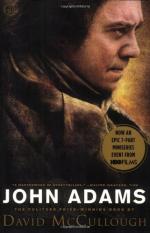|
This section contains 3,922 words (approx. 14 pages at 300 words per page) |

|
SOURCE: “Views on Property and Democracy,” in Revolutionary Values for a New Millennium, Lexington Books, 2000, pp. 173-179.
In the following excerpt, Hill claims that Adams's writings on the balance of power were misunderstood: Adams had not abandoned democracy as his critics claimed.
Two years before the Essex convention John Adams wrote about the issue of property in terms similar to the convention statement: “Such is the Frailty of the human Heart, that very few Men, who have no Property, have any Judgment of their own. They talk and vote as they are directed by Some Man of Property, who has attached their minds to his interest.”1 Adams, as indicated in earlier chapters, was concerned about anything with potential to corrupt the new republic. Dependence was only one such factor; economic inequalities were another: “Property monopolized or in the Possession of a few is a Curse to Mankind. We...
|
This section contains 3,922 words (approx. 14 pages at 300 words per page) |

|


